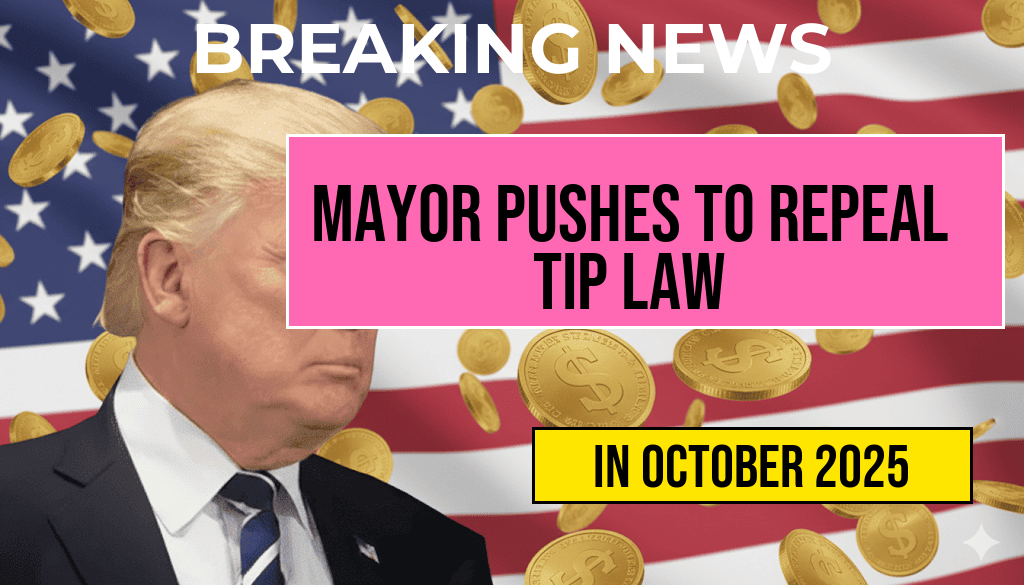The mayor’s recent push to repeal the city’s controversial tip law aims to tackle a staggering $1 billion budget shortfall that has left local officials scrambling for solutions. In a statement released on Monday, the mayor emphasized the urgency of addressing the budget crisis while proposing a shift in how service industry workers are compensated. The tip law, implemented several years ago, requires a significant portion of service employees’ wages to come from customer gratuities. Critics argue that this model has led to wage instability, particularly in light of the ongoing economic challenges faced by many families. Proponents of the repeal believe that eliminating this law could not only stabilize income for workers but also generate additional tax revenue that could help alleviate the city’s financial woes.
Understanding the Current Budget Crisis
The city’s budget shortfall can be attributed to a variety of factors, including reduced tax revenues, increased demand for public services, and rising operational costs. A recent analysis by the city’s finance department revealed that the shortfall is projected to impact essential services such as public safety, education, and infrastructure maintenance. To better understand the scope of the financial challenges, the following breakdown illustrates the key areas affected:
| Category | Impact ($ Billion) |
|---|---|
| Public Safety | 0.4 |
| Education | 0.3 |
| Infrastructure | 0.2 |
| Social Services | 0.1 |
The Tip Law and Its Implications
The tip law has been a subject of heated debate since its inception. Supporters argue that it allows service workers to earn more during busy periods, while detractors contend that it creates inequities in earnings and may lead to fluctuations in income. According to a report from Forbes, nearly 80% of service workers rely on tips as a significant portion of their income. The mayor’s proposal seeks to shift the financial burden off the customers and ensure a stable wage for workers.
Potential Economic Impact
Repealing the tip law could have far-reaching effects on the local economy. By establishing a more predictable wage structure, workers may experience increased financial stability, which in turn could lead to higher consumer spending. A study published by the Washington Post indicates that increased disposable income among service workers can stimulate local businesses and enhance overall economic growth.
Community Reactions
Reactions to the mayor’s proposal have varied widely across the community. Many service industry workers have expressed optimism, viewing the repeal as an opportunity to secure better wages without dependence on fluctuating tips. Conversely, some restaurant owners and business operators have voiced concerns regarding the potential increase in labor costs, which they fear could lead to higher prices for consumers.
- Supporters: Service workers, labor unions, and economic advocates.
- Opponents: Restaurant owners, some customers, and economic conservatives.
The Path Forward
As discussions continue, city council meetings are expected to be crowded with stakeholders from both sides of the issue. The mayor has promised to engage in open dialogue with business owners and employee representatives to find a solution that addresses the budget shortfall while supporting the workforce. The next city council session, scheduled for next week, will include a formal discussion on the proposed repeal and its potential implications.
In light of the ongoing budget crisis, the outcomes of these discussions could set a significant precedent for labor laws in the city and potentially influence similar debates nationwide. As the mayor advocates for change, the eyes of both local residents and national observers will be closely watching how this situation unfolds.
Frequently Asked Questions
What is the tip law that the mayor wants to repeal?
The tip law refers to regulations that govern how tips are distributed and reported in the service industry. The mayor believes that repealing this law could help generate additional revenue to address the city’s $1 billion budget shortfall.
How does repealing the tip law help with the budget shortfall?
By repealing the tip law, the city could potentially impose higher taxes on tips, which would increase revenue. This added income could play a significant role in addressing the budget shortfall and funding essential services.
What are the potential consequences of repealing the tip law?
Repealing the tip law could lead to increased costs for restaurants and service businesses, which may pass these costs onto customers. Additionally, it could impact the earnings of service workers who rely on tips as a substantial part of their income.
What has been the response from the community regarding the mayor’s proposal?
The community’s response has been mixed; some support the measure as a necessary step to resolve the budget shortfall, while others express concern about the potential negative effects on service workers and the local economy.
Are there alternative solutions being considered to address the budget shortfall?
Yes, alongside the repeal of the tip law, the mayor is exploring other options such as budget cuts, increased taxes in other areas, and potential grants to help alleviate the $1 billion budget shortfall.







